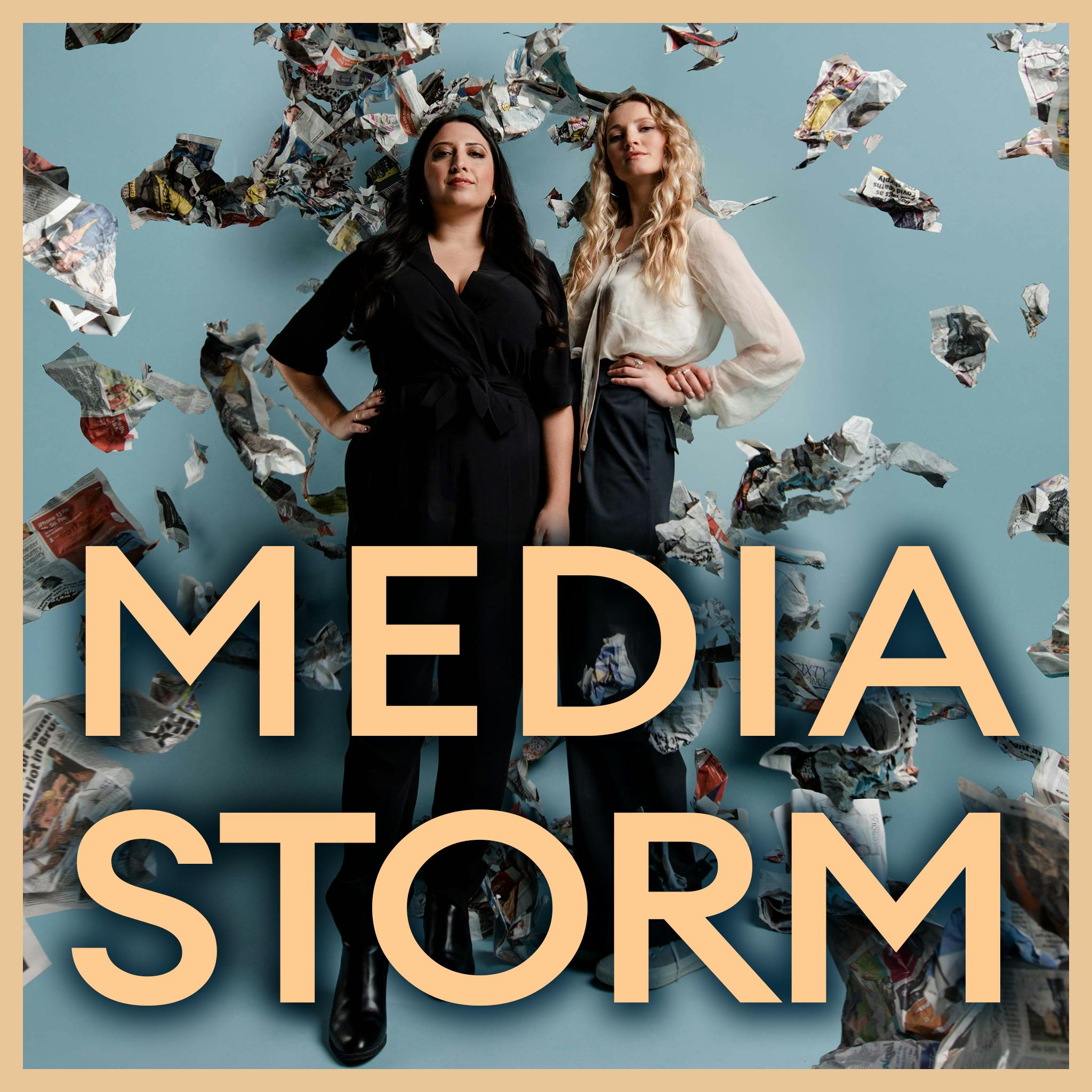
Is the media responsible for the rise of Reform?

Media Storm
Deep Dive
- Technical difficulties with live show audio led to an audio article adaptation.
- Introduction to the Media Storm column in Byline Times.
- Proposal for future audio articles based on audience feedback.
Shownotes Transcript
She's made up her mind, if pretty smart. Learned to budget responsibly right from the start. She spends a little less, puts more into savings. Keeps her blood pressure low when credit score raises. She's gotten debt right out of her life. She tracks her cash flow on a spreadsheet at night. Boring money moves make kind of lame songs, but they sound pretty sweet to your wallet. BNC Bank. Brilliantly boring since 1865.
Starting a business can seem like a daunting task, unless you have a partner like Shopify. They have the tools you need to start and grow your business. From designing a website, to marketing, to selling and beyond, Shopify can help with everything you need. There's a reason millions of companies like Mattel, Heinz, and Allbirds continue to trust and use them. With Shopify on your side, turn your big business idea into... Sign up for your $1 per month trial at shopify.com slash special offer.
Hello MediaStormers, it is Matilda. Helena is away, so you have me this week. And things may go a little bit rogue compared to usual. It's not entirely my fault. This week we were hoping to bring you the live show audio from our discussion last week with Milo Edwards, comedian, and Natasha Devon, LBC broadcaster.
We debated the most unhinged headlines of 2025. Sadly, I logged on this morning to edit that audio and discovered that it sounded like a robot had shat it out, and I didn't want you guys to have to sit through that. So, I started writing our weekly column. For those of you who don't know, MediaStorm has a weekly column in Byline Times. And this week, I wrote about the third of the headline topics that Helena and I discussed...
whether the media is responsible for the rise of reform. So while we work out how to bring you the other topics we discussed on the panel, this week I'm bringing you an audio article to introduce you to our column at Byline Times. And if you don't already read Byline, you definitely should. They're very good at spotting things that the mainstream media you otherwise rely on might have missed.
Our column comes out every Friday. If you like this audio article and you want us to record more like it, do let us know. It won't replace MediaStorm's regular content, but it might be a way that we can bring you more bonus content without too much difficulty. If you don't like it, just tune out, but make sure you tune back in next week where we'll be bringing you more of our MediaStorm usuals.
And also, make sure you come to our live show next time, because you never know what's going to happen to that audio, especially when you have hosts who repeatedly forget to record backups. Anyway, here we go. Let's talk about how the media is fueling the rise of reform. This is not a new topic. We have seen and heard mainstream journalists, editors and broadcasters asking each other, are we responsible for the rise of reform?
But after a cursory moment of introspection, they generally reaffirm their own journalistic decision-making and deflect culpability onto other pied pipers. When the newsagents were asked this question by a listener, they decided it was a lefty cop-out to blame the media for the rise of reform.
Yet I have seen nothing but media cop-outs, and most offensively, a media continuing unchanged. The truth is, our media did not just fuel the rise of reform. They cashed in on it.
Of course, there is not a straightforward channel of blame. And I say blame to condemn not the rise of a party, but the fact the party rising was one founded on hatred. On the one hand, yes, UK outlets are guilty of giving reform disproportionate coverage with disproportionately singular focus on frontman Farage.
And yes, politics pages have long been locked in a two-party matrix that fails to cater to those pouring out of its rusty crevices.
On the other hand, no, this is no longer the newspaper era when Murdoch made the man in charge. There's a myriad of social and alternative media, some fronted by Farage, with whom the mainstream must compete. And no, the mainstreaming of far-right ideas is not an exclusively British phenomenon. Also no, there are not many inspiring alternative parties willing to break from the broken status quo.
But to set the parameters of this debate around reform itself is to entirely miss the point. The key way in which our media has failed us is by making the most clickable politics the most successful.
With one hand, our media has shunned reform as unserious, thereby playing into their anti-establishment narrative, while fanning with the other hand the flames of culture warfare and us-versus-them identity-making on the right and the left alike that give reform such an easy route forwards without requiring them to offer root cause solutions.
In many ways, our media repeatedly falls into the trap that extremists lay out for us. Radicalisation researcher Dr Rajan Basra told MediaStorm. This was back in 2022 when we were investigating a far-right attack on an asylum centre in Dover, which occurred amid headlines of an invasion on our border. Headlines that quoted then Home Secretary Suella Braverman in her carefully clickable wording.
This trap, Baz recalls, destroying the grey zone.
Quote, whether it's ISIS or someone from the far right, extremists want to destroy the nuance, the moderate view, the understanding that could bridge divides. They want us to think in us versus them, in black and white. I don't know if it's just how the media is structured, he lamented. The sad truth is, it largely is, ad-funded media quite literally live off clicks, and even editors at other outlets
pour over most red leaderboards and pressure reporters to compete accordingly. It's therefore easy for politicians, especially former media personalities like Nigel Farage and Donald Trump, to write headlines they know the media will repeat, even if they're inaccurate or immaterial or in no way ameliorate people's day-to-day issues because they're clickable.
In this way, our media prostitutes its services out to politicians in exchange for clicks. The cost is moderate politics. Clickbait naturally favours extremist messaging. In the clickbait cooker, certain ingredients take heat and rise, while others flatten and get discarded.
Seeds of division offer more bite than universal values. Fear is far more flavorful than facts. Ridicule makes a better roast than reason. These ingredients may make juicier headlines, but they are also the ingredients of nascent fascism. We have seen them poison democracies before, and we have said, never again.
I'm not telling our media to boycott legitimate parties or bury their heads in the sand. Just stop doing all the other shite we call out in this column every week. Stop publishing data that falls far below the threshold of academic publication. Stop letting charismatic politicians write their own headlines.
Stop butchering nuanced reporting with exaggerated headlines that blatantly misrepresent the articles themselves. And stop dehumanizing minorities by denying them voice in coverage that is directly and primarily about them.
Of course, it is complicated calling something extremist once it has officially entered the mainstream. Britons are now slightly more likely to consider Reform UK as the main opposition party ahead of the Conservatives. That's 37 to 33 percent, according to Ipsos. But there is a set definition of far-right ideology, and it does not change or become less alarming the more people that vote for it.
That said, people voting for reform are not the problem. They are us. We all have to take a bit of responsibility. That's a quote from LBC broadcaster Natasha Devon when she joined MediaStorm's live debate on this topic. By not bothering to engage as much with nuanced, thoughtful, long-form journalism, we fuel the clickbait market. End quote.
We are all responsible for the ways in which our society allocates political currency, for the ways we condemn each other before seeking to understand, for the ways we emote when we should rationalize or rationalize when we should emote. But unlike the clickbait media, we do not all cash in on it.
The ability of the far right to thrive again in a post-Nazi world is a damning indictment of a media so commercialized it is willing to reward whichever would-be leader incites the public to click on it. Thank you for listening. That was Media Storm's column, which will be out in byline times this Friday, as it appears every Friday. See you next week.
so